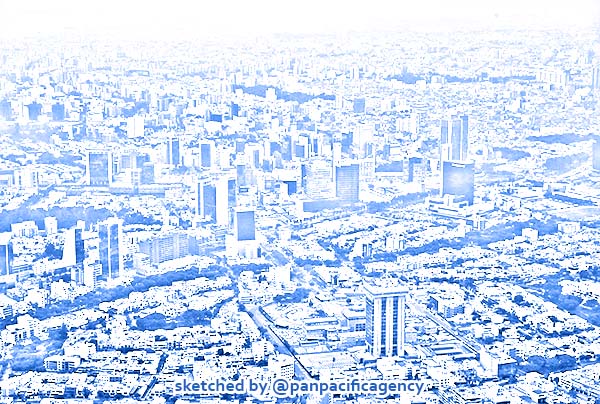“No expropriations, no nationalization, or price controls” in Peru

Lima, capital of Peru. Photo: ANDINA. Sketched by the Pan Pacific Agency.
LIMA, Jun 19, 2021, MercoPress. Pedro Francke, a 60-year-old economy professor and advisor to presidential frontrunner Pedro Castillo, has announced “there will be no expropriations, no nationalization, or price controls” in Peru, the Madrid daily El País reported, MercoPress reported.
The leftist Castillo edged conservative candidate Keiko Fujimori by 44,000 votes on June 6’s presidential runoff but cannot be declared the winner just yet because petitions for annulments of some polling stations have been filed by both contenders and electoral authorities need to pass judgement on them. Given the small difference in votes, anything can technically happen.
However, the prospects of a president like-minded to former Venezuelan ruler Hugo Chávez has led Peru’s wealthiest families and companies to take precautions and move their assets and liquidity elsewhere. But Francke said there was no need to worry.
“There will be no nationalization, no expropriations, or price controls. We have put ourselves a little more in favour of the market.”
It was also reported that since Francke’s arrival onto Castillo’s campaign team, the rural leader has softened many of his initial proposals.
Francke has been a high ranking official under former Presidents Alejandro Toledo and Ollanta Humala. His economic views can be summed up in one quote published by El País: “Of the Latin American experiences, I like the Uruguayan the most.”
During his campaign, Castillo toured the country with a speech against foreign investment and in favour of protectionism where, for example, miners would have their days numbered. Such a hard stance led the business community to support Fujimori en masse, even those who Keiko a lesser evil.
Francke believes that Castillo was someone in search of attention: “He said all that when he did not have a very strong candidacy.” But the truth remains that the rural school teacher is at the gates of the Government Palace, aboard the Peru Libre party, which declares itself Marxist-Leninist.
Francke recalled that a revision of transnational contracts or hypothetical nationalizations have been raised under President Humala, but it was rejected by the business community.
But now “the difference is that the price of copper, our main export, is very high and international analysts say that this has been going on for a while. It is not a thing of the year, there are reasons such as the growth of China, the policy of [US President] Joe Biden and a strong technological change due to the high demand for copper for electricity. I estimate that companies, only in copper, have an additional income of US $ 9 billion.”
In his first debate with other candidates, Castillo started by assuring that he would propose drafting a new Constitution. That implies a long process to achieve a majority in Congress – unlikely – to call a referendum and to convene a Constituent Assembly. What exactly does he mean when he says that the government should have greater power over the economy? “The current Constitution”, explains Francke, “has some padlocks that make it difficult to take some measures. It says that foreign investment has the same rights as a national investment. No constitution in the American continent has an article like that,” he claimed.
“That’s right. If the left wins, that it can apply leftwing policies. With some limits, of course. Like, for example, the autonomy of the Central Reserve Bank. Yes, that must be maintained because it is the balance of powers, but also because it is the global management of the institutions of the economy. But with these other things, I do not understand why it is positive that a Constitution tells you that foreign investment has to be the same as a national investment,” Francke said.
The dollar reached its all-time high in Peru after Castillo’s victory. Now it seems to have stabilized. Francke’s visibility has been key to this. The economist assures that the minimum wage will not be touched by the bad economic times that companies are experiencing with the pandemic. The private pension system will not be eliminated, as Castillo had hinted, making some workers fear for the future of their savings. But he will nonetheless try to reform the pension system because he considers that the current one is inefficient.
Francke does not rule out applying tariffs to certain products such as potatoes. But ”there should be a reasonable limit. We would not go back to the 1970s, when the tariff was 70%, due to the international treaties we have and because it is not convenient (…). But we import 30,000 tons of frozen potatoes. Peru with little effort could produce them” locally.
Francke also addressed the issue of tolls and corruption. He said he disliked the fact that whenever “I go through one and I know that 25% of what I pay is for Odebrecht (a Brazilian construction company that bribed dozens of officials to win public works concessions) The truth is that I do get upset.”
Professor Francke is a likely candidate to become finance minister in case Castillo finally takes office.
Castillo has often been accused of trying to start the same path of nationalization that Cuba and Venezuela undertook in their day, but Francke said it happening in Peru “doesn’t make any sense.”
Francke also pointed out that Peru was one of the few countries with a large population living in areas 3,500 meters above sea level. He pointed out only Bolivia, Ethiopia and China… “and I think Nepal” did. “Some businessmen tell me that taking their wood to Lima costs them more than taking it from Lima to Thailand.”